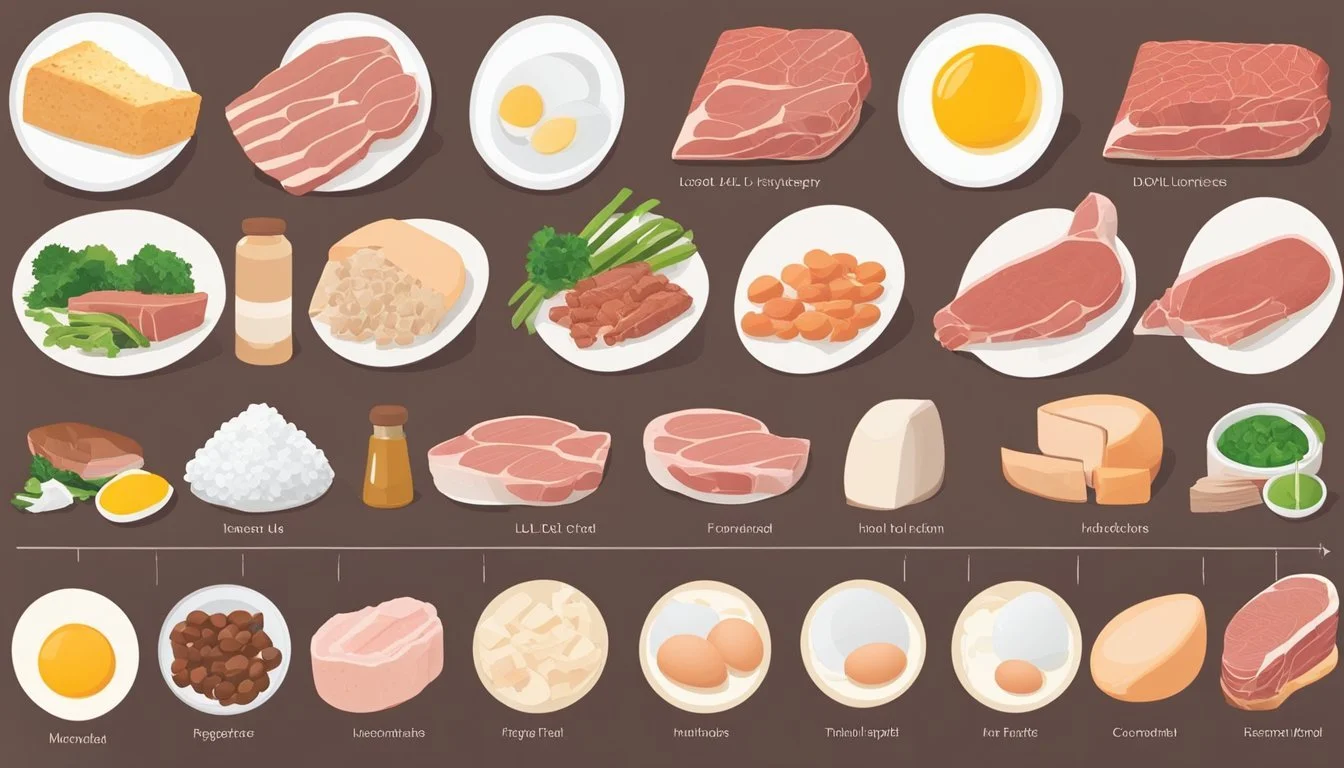Carnivore Diet and the Impact on Blood Lipid Profiles
Unveiling the Cholesterol Mystery
The carnivore diet, which is characterized by an intake exclusively of meat, fish, and other animal products, challenges conventional dietary recommendations by eliminating fruits, vegetables, and grains. Proponents tout benefits such as weight loss and improved blood sugar regulation, but the diet's impact on blood lipid profiles has become a focal point for both supporters and critics. Blood lipid profiles, which include cholesterol levels, are critical indicators of cardiovascular health, and the influence of a heavily meat-based diet on these markers is under scrutiny.
With a high consumption of saturated fats from animal products, the carnivore diet raises questions about its influence on cholesterol levels. High levels of LDL cholesterol, often labeled as 'bad' cholesterol, are linked to an increased risk of heart disease. Conversely, the diet's restriction of carbohydrates and processed foods could potentially lead to favorable lipid profile changes for some individuals. The balance of these effects is crucial for understanding the diet's overall impact on health.
Scientific investigations and emerging studies delve into how such a diet might produce lipid profiles similar to those seen in familial hypercholesterolemia, a genetic disorder characterized by high cholesterol levels. It is essential to consider these findings within the broader context of individual health profiles and dietary patterns to determine the long-term implications of adhering to a carnivore diet.
Fundamentals of the Carnivore Diet
The Carnivore Diet primarily consists of consuming animal products, including meat, fish, and eggs, with a strong emphasis on high-fat and protein-rich foods. Adherents avoid all plant-based foods, which means no fruits, vegetables, grains, legumes, nuts, or seeds. It resembles a ketogenic diet in its macronutrient composition, favoring fat as the primary source of energy. However, the Carnivore Diet is more restrictive, eliminating even the few plant-based foods permitted in a ketogenic diet.
Typically, the diet results in a consumption pattern that is rich in:
Protein: Essential building blocks for the body's cells and tissues, sourced mainly from meat and fish.
Fat: Including both saturated and unsaturated fats, which are used for energy and metabolic functions. With a high intake of animal products, the diet tends to be high in saturated fats.
Nutrient Sources
Protein:
Sources: Beef, poultry, fish, eggs
Fat:
Sources: Meats, cheeses, butter
Though the Carnivore Diet aligns with high-fat dietary approaches, it's unique in its exclusion of all plant matter. Proponents argue the diet can lead to weight loss and improved mood, though these benefits are not universally accepted nor thoroughly studied.
Criticism arises due to concerns over the long-term health impacts of such a diet, particularly with respect to potential imbalances and the absence of nutrients typically acquired from plant sources. Still, its simplicity and purported benefits garner interest, and it continues to be a topic within dietary and health discussions.
Blood Lipid Profiles Explained
Blood lipid profiles are critical indicators of cardiovascular health, consisting of several components, each playing a distinct role in the body's lipid metabolism. Lipoproteins function as carriers for lipids in the bloodstream, they are essential for transporting cholesterol and other fats.
Total cholesterol, a measure of all cholesterol in the blood, is a combination of low-density lipoprotein (LDL), high-density lipoprotein (HDL), and other lipid components. LDL cholesterol is often referred to as "bad" cholesterol because elevated levels can lead to plaque buildup in artery walls, heightening the risk of heart disease. Conversely, HDL cholesterol is known as "good" cholesterol due to its role in removing cholesterol from the bloodstream, delivering it to the liver for excretion or re-utilization.
Triglycerides are another form of fat found in the blood. High levels can arise from excess calorie intake and are associated with an increased risk of heart disease.
Here's a snapshot of the components included in a typical lipid profile:
Total Cholesterol: Sum of blood's cholesterol content
LDL (Low-Density Lipoprotein): Labelled "bad" cholesterol; excessive levels can lead to heart disease
HDL (High-Density Lipoprotein): Known as "good" cholesterol; helps reduce heart disease risk
Triglycerides: A type of fat; elevated levels can indicate an increased risk of heart disease
Healthcare providers utilize lipid profiles to manage and monitor a patient's risk of developing heart disease. By examining these levels, they can recommend dietary and lifestyle changes or medications to achieve a healthier balance and prevent cardiovascular complications.
Effects of the Carnivore Diet on Cholesterol Levels
The carnivore diet, which primarily consists of animal products, raises questions regarding its impact on cholesterol levels. The diet's influence on low-density lipoprotein (LDL-C) and high-density lipoprotein (HDL-C), the roles of triglycerides and their effect on total cholesterol are critical points of consideration.
Influence on LDL and HDL Cholesterol
Evidence suggests that the carnivore diet can affect the balance of LDL and HDL cholesterol, key components of one's cholesterol profile. LDL cholesterol, often termed 'bad' cholesterol, may increase due to the high intake of saturated fats from animal products. Conversely, this diet might also lead to an elevation in HDL cholesterol, commonly known as 'good' cholesterol, as it eliminates processed foods known to negatively influence HDL-C levels.
Understanding Triglyceride Levels
Triglycerides are another important factor in the blood lipid profile. The carnivore diet, being low in carbohydrates, might reduce triglyceride levels as it minimizes the intake of sugars and refined carbohydrates, which are linked to high triglycerides. However, individual responses can vary, and monitoring these levels is key to understanding the diet's impact on cardiovascular risk.
Impact on Total Cholesterol
The total cholesterol measurement reflects the cumulative amount of cholesterol in the blood, including LDL-C, HDL-C, and very low-density lipoprotein cholesterol (VLDL-C). Adherents of the carnivore diet may witness alterations in their total cholesterol levels due to significant dietary changes. Regular screening through lipid panels is recommended to gauge these changes and manage potential health risks.
Carnivore Diet and Cardiovascular Health
The carnivore diet, which prioritizes animal-based foods while excluding most plant-based foods, has potential implications for cardiovascular health. It has been observed that this diet could influence heart disease factors, including blood lipid profiles and blood pressure.
Atherogenic Lipoproteins: A diet high in saturated fats and cholesterol, common in an animal-based diet, can lead to an elevation in low-density lipoprotein (LDL) cholesterol. High levels of LDL cholesterol are associated with an increased risk of cardiovascular disease due to their role in the formation of atheromatous plaques within arteries.
Blood Pressure: Blood pressure regulation is another cardiovascular concern. Some studies imply that the exclusion of plant-based foods could result in insufficient intake of nutrients that support vascular health, potentially leading to increased blood pressure. However, data are inconclusive, and individual responses to the diet may vary.
Heart Disease: Research indicates that diets with a high consumption of animal products may escalate the risk factors associated with heart disease. For instance:
Increased cardiovascular toll-like receptor signaling, a response to serum endotoxins, has been connected to heightened cardiovascular risk.
The renin-angiotensin system, important in blood pressure regulation, can be affected, raising concerns about the long-term cardiovascular implications of the carnivore diet.
In examining the relationship between the carnivore diet and cardiovascular diseases, it is crucial to evaluate the balance of available evidence, recognizing that diet is a modifiable risk factor in the spectrum of cardiovascular health determinants.
Comparative Analysis: Carnivore Diet vs. Other Dietary Approaches
This section examines the impact of the carnivore diet on blood lipid profiles in comparison to other dietary approaches, focusing on the intake of specific nutrients and their potential effects on cholesterol and other key lipid indicators.
Carnivore vs. Plant-Based Diet
A plant-based diet is rich in fiber, whole grains, vegetables, and fruits—components known to support healthier blood lipid levels due to their low saturated fat content and cholesterol-lowering effects. In contrast, the carnivore diet consists exclusively of animal products, which may lack these beneficial plant compounds and typically have a higher saturated fat content, potentially leading to an increase in LDL cholesterol levels.
Carnivore vs. Mediterranean Diet
The Mediterranean diet includes a variety of foods such as vegetables, fruits, whole grains, and a moderate amount of fish and dairy, all fostering a balance of macronutrients and beneficial lipids like omega-3 fatty acids. A consistent intake of these foods, especially those high in monounsaturated fats like olive oil, may have a favorable impact on overall blood lipid profiles. Given the carnivore diet's exclusion of plant-based foods and limited variety in fat types, its effects on blood lipids could differ significantly from those of the Mediterranean diet.
Ketogenic Diets and Low-Carbohydrate Approaches
Ketogenic diets prioritize high fat and protein intake with minimal carbohydrates, aligning somewhat with the carnivore diet's macronutrient distribution. Low-carbohydrate diets can induce weight loss and potentially improve triglyceride and HDL cholesterol levels. The carnivore diet also reduces carbohydrate intake to a minimum; however, it goes further by eliminating all plant sources, which may affect fiber intake and thus could have different outcomes on lipid markers compared to ketogenic and other low-carbohydrate diets.
Potential Risks and Health Implications
The carnivore diet, while gaining popularity for various health claims, raises concerns regarding its potential impact on blood lipid profiles and the broader spectrum of health risks. This section explores critical aspects that individuals considering this diet should be aware of.
Nutrient Deficiencies and Long-Term Health
Adherents of the carnivore diet primarily consume animal products, potentially leading to specific nutrient deficiencies due to the exclusion of plant-based foods. Key nutrients of concern include:
Vitamin C: Usually associated with fruits and vegetables, deficiency can lead to scurvy.
Fiber: Absent in animal products, it is essential for gastrointestinal health and regularity.
Calcium: Typically lower in a meat-only diet, which may affect bone health over time.
Antioxidants and Phytochemicals: Found in plants and known to reduce inflammation and oxidative stress.
The omission of these nutrients can have various health implications, including increased risks of cardiovascular disease due to alterations in blood lipid profiles - specifically raised LDL cholesterol levels and potentially increased risk of atherosclerosis.
Controversies Surrounding the Carnivore Diet
The carnivore diet is contentious, with debates often focused on its impact on cardiovascular health. Critics argue that high consumption of red and processed meat has been linked to increased cardiovascular risk due to the potential elevation of "bad" LDL cholesterol, a well-established risk factor for heart disease. Yet, some proponents cite anecdotal evidence of improved blood lipid levels. However, the absence of long-term peer-reviewed studies on this diet limits the ability to draw definitive conclusions.
Moreover, the environmental impact of a meat-centric diet is also debated, alongside ethical considerations of animal consumption. Such controversies underscore the importance of extensive research before adopting dietary changes with profound potential health implications.
Research and Studies on Carnivore Diet Outcomes
Numerous studies have scrutinized the carnivore diet, focusing on its effects on blood lipid profiles and potential risks of cardiovascular disease. A report involving 2,029 respondents, who adhered to a carnivore diet for an average of 14 months, suggests a predominant intake of red meat. This diet, usually rich in saturated fats and cholesterol, might typically raise concerns regarding heart health.
Clinical trials specific to the carnivore diet are limited; however, parallels are often drawn from low-carbohydrate and ketogenic diet studies. Researchers are particularly interested in the long-term impact on heart failure incidence and cardiovascular risk markers within carnivore diet followers.
Prospective cohort studies are valuable for these dietary assessments, though few have directly examined carnivore diet adherents. They've provided insights into the relationship between red meat consumption and lipid profiles. Early findings indicate that a plant-free diet may significantly alter cholesterol levels, with implications for heart disease risk.
Key Results from Studies Include:
An increase in LDL cholesterol (commonly referred to as 'bad' cholesterol).
A potential rise in HDL cholesterol ('good' cholesterol).
Changes in triglyceride levels, though these results are varied across studies.
Scientists remain cautious, noting the necessity for further research to establish a clearer understanding of the long-term health outcomes related to exclusively meat-based diets. It's emphasized that individuals considering this diet must consult health professionals, especially if they have pre-existing health conditions or risks for cardiovascular disease.
Modification and Optimization of the Carnivore Diet
The Carnivore Diet, while primarily focusing on animal products, can be personalized to cater to individual health goals and requirements. Strategic inclusion of certain foods and careful monitoring can optimize health outcomes.
Inclusion of Select Foods
Some individuals tailor the Carnivore Diet to include a limited range of plant-based items to address specific nutritional needs and potential deficiencies. They may add:
Fruits: For those concerned with vitamin C and fiber intake.
Leafy Greens: An option to provide micronutrients and facilitate digestion.
Adjustments for Individual Health Needs
Adapting the diet to individual health needs is crucial. For instance:
A person with diabetes might monitor their protein sources and consider the glycemic impact of any plant additions.
Monitoring blood lipid profiles is essential, as diets high in saturated fats can impact cholesterol levels.
Those aiming for weight loss may adjust fat intake and caloric density to maintain a caloric deficit.
Role of Medical Supervision
Medical supervision ensures that individuals can safely adhere to the diet while managing any health conditions. Doctors may:
Adjust or prescribe statins or other medications as necessary, monitoring for interactions.
Regularly review blood lipid profiles and overall health to track the diet’s impact and make necessary adjustments.
Incorporating selective dietary changes and ongoing health assessments is key to safely adapting the Carnivore Diet to meet personal health goals.
Carnivore Diet and Inflammation
The impact of a carnivore diet on inflammation in the human body is an area of growing interest. Inflammation serves as the body's inherent defense mechanism against injuries and infections; however, chronic inflammation is associated with various diseases, including cardiovascular disorders.
A carnivore diet, which consists predominantly of animal products, might affect inflammation in several ways. Specific inflammatory markers, such as C-reactive protein (CRP), tumor necrosis factor (TNF), and interleukins, can indicate the level of inflammation within the body.
Effect on Inflammatory Markers: Some studies suggest that carnivore diets can influence these markers, either by increasing or decreasing their levels. Yet, the scientific community has not reached a consensus, as the results vary significantly across different studies.
Diet Composition: The nature of the meat consumed—whether it is processed or unprocessed, the presence of fatty acids like omega-3 and omega-6, and the cooking method—can play significant roles in how the diet impacts inflammation.
Individual Variation: Individuals may respond differently to a carnivore diet. For some, the diet may lead to an increase in certain inflammatory markers, whereas others may experience no change or even a reduction.
Research has also examined the potential anti-inflammatory effects of a carnivore diet due to the exclusion of dietary elements that could trigger inflammation, such as certain carbohydrates. However, long-term studies are needed to fully understand the implications of this dietary pattern on chronic inflammation and related health outcomes.
Lifestyle and Environmental Considerations
When individuals adopt a carnivore diet, lifestyle changes are inevitable, influencing not just health but also cooking methods and environmental sustainability. They primarily consume meat, fish, and animal products, which impacts how they prepare meals. Traditional cooking practices, such as grilling or roasting, may become more prevalent. It's crucial, however, for individuals to consider the potential health effects of these methods, as high-temperature cooking can lead to the formation of harmful compounds like advanced glycation end products.
Lifestyle Changes:
Shift to high reliance on animal products
Potential reduction in cooking complexity
Cooking Methods:
Preference for grilling and roasting
Increased exposure to compounds from high-temperature cooking
If you're looking for an electric griller and electric roaster oven buying it online is your best bet!
The sustainability of a carnivore diet is another consideration. Diets rich in animal products typically have higher ecological footprints due to the resources required for livestock production, such as land, water, and feed. Consequently, adherents of the carnivore diet may engage in debates on ethical sourcing and the environmental impact of their dietary choices.
Sustainability Factors:
Higher greenhouse gas emissions from livestock
Large water usage for meat production
Land-intensive processes
They might seek responsible sources of meat that prioritize animal welfare and lower environmental impact. Some may support regenerative agriculture practices that aim to improve soil health, carbon sequestration, and biodiversity. Through these efforts, individuals can help mitigate some environmental concerns associated with a carnivore diet.
Weight Management and the Carnivore Diet
The Carnivore Diet, which emphasizes the consumption of animal products and the exclusion of carbohydrates, is often considered for weight management. Proponents point to its simplicity and potential for weight loss outcomes due to its high protein and fat content, which may enhance satiety and reduce overall calorie intake.
Observations in Weight Loss and Obesity
Weight Loss: Individuals on the diet may experience a significant calorie deficit, aiding in initial weight loss.
Satiety: Protein-rich diets can promote feelings of fullness, which might support weight loss efforts.
However, research on long-term sustainability is limited, and concerns about nutrient deficiencies and potential health risks are raised by experts.
Potential Concerns
Nutrition Balance: The diet lacks fiber and certain vitamins found in plant-based foods, which are essential for a balanced diet.
Long-term Efficacy: There is a lack of data regarding long-term adherence to the diet and whether the initial weight loss can be maintained.
Weight Management Strategies
For weight management, it is crucial to consider a diet's nutritional completeness, its ability to support long-term health, and its sustainability over time. While some may find short-term success with the Carnivore Diet in terms of weight loss, a comprehensive strategy should include attention to overall dietary patterns, regular physical activity, and other lifestyle factors that aid in the maintenance of a healthy weight.
Carnivore Diet in Specific Populations and Conditions
The carnivore diet, a regimen consisting solely of animal products, has varied impacts depending on the specific population and condition. Research is scant but suggests interesting outcomes in certain groups.
In individuals with epilepsy, ketogenic diets, which are high in fat and low in carbohydrates, have been used for seizure control. The carnivore diet, being almost zero-carb, may offer similar benefits due to its ketosis-inducing nature. However, long-term effects and the diet's suitability compared to standard ketogenic diets require further investigation.
Those with diabetes may find the carnivore diet influences blood sugar levels. Since the diet eliminates carbohydrates, it can lead to fewer blood sugar spikes and improved glycemic control. Yet, caution is advised as this diet lacks dietary fiber and certain micronutrients present in plant foods, which are important for overall health.
Regarding popular diets, the carnivore diet stands out for its exclusion of all plant-based foods. It contrasts with other popular diets like the paleo diet or Mediterranean diet, which include both plant and animal sources.
Potential Impact of Carnivore Diet on Various Conditions
Epilepsy:
Potential Impact: May induce ketosis, which could possibly aid in seizure control.
Diabetes:
Potential Impact: Can result in fewer blood sugar spikes; however, it requires caution due to the need for comprehensive nutritional management.
Comparison with Popular Diets:
Potential Impact: The carnivore diet is more restrictive and lacks the variety of plant-based nutrients found in other popular diets.
Researchers and healthcare professionals emphasize the need for careful consideration and monitoring when adopting such a restrictive diet, particularly in populations with pre-existing health conditions. Individual responses to the diet can vary, and it is paramount to consult with a healthcare provider before starting any new dietary regimen.
Anecdotal Evidence and Personal Testimonies
Anecdotal evidence from individuals who have adopted the carnivore diet, which is essentially a zero carb regimen, often describes significant weight loss and health improvements. They report a variety of benefits ranging from increased energy levels to reductions in inflammatory conditions. Personal testimonies commonly emphasize the simplicity of a diet consisting solely of animal products and the perceived ease of managing food choices.
For instance, some followers, like Brian Nowicki, have publicly shared their significant weight loss experiences, attributing a reduction of 80 pounds to the adherence to this dietary pattern. Other anecdotal claims include enhancements in mental clarity and physical performance. Proponents often suggest that the carnivore diet's elimination of carbohydrates contributes to these positive outcomes.
However, it should be noted that these testimonials represent individual experiences and may not be reflective of broader, evidence-based research outcomes. While personal accounts can be compelling, they lack the rigor of scientific studies, and thus, their reliability as a source for health recommendations is limited. Additionally, the absence of carbohydrates in the diet raises nutritional concerns among healthcare professionals regarding potential long-term health effects.
In summary, many advocates of the carnivore diet share positive health transformations, but their experiences remain classified as anecdotal evidence. The zero carb nature of the diet is central to these narratives, although it remains controversial among nutrition and medical experts.
Conclusion
The carnivore diet, primarily consisting of animal foods, has implications for blood lipid profiles. Emerging discussions suggest that individuals on this diet may experience elevation in LDL-C levels, which are associated with increased cardiovascular risk. Amidst the debates, some argue that a rise in blood cholesterol should not prompt immediate concern.
Medical supervision is recommended for individuals considering or currently following the carnivore diet. Monitoring lipid profiles is crucial, as is assessing individual cardiovascular risk factors. Diverse responses to dietary cholesterol underscore the importance of personalized healthcare guidance.
Practical recommendations include incorporating a variety of healthy fats to potentially mitigate adverse lipid changes. These include monounsaturated and polyunsaturated fats, such as those from nuts, seeds, avocados, and olive oil. Transitioning from a high-fat, low-carbohydrate diet to a more balanced dietary pattern may also be advised to lower the risks of prolonged elevated cholesterol levels.
In conclusion, the carnivore diet's impact on blood lipids is multifaceted and requires further study. Individuals must proceed with caution, seeking medical supervision and considering adjustments for a balanced nutrient intake to safeguard cardiovascular health.












